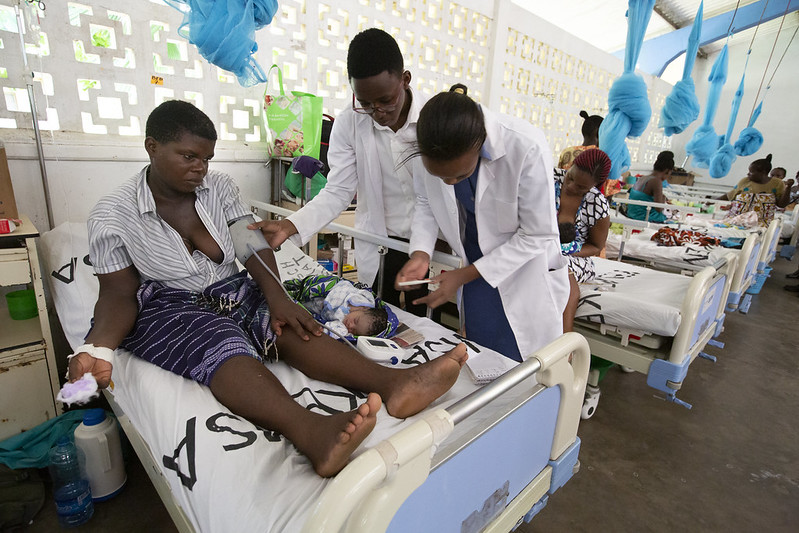AI Innovations Improve Health care in Kenya
 Kenya is currently experiencing a boom in medical AI innovations. From the minds of hardworking scientists and medical groups, sprouts one solution to a modern health care crisis. Efficient and effective health care in Kenya is limited. The industry is in need of additional medical professionals and general resources.
Kenya is currently experiencing a boom in medical AI innovations. From the minds of hardworking scientists and medical groups, sprouts one solution to a modern health care crisis. Efficient and effective health care in Kenya is limited. The industry is in need of additional medical professionals and general resources.
Additionally, the amount of health care providers in Kenya is extremely disproportionate to its population. According to the World Health Organization (WHO), Kenya employs approximately 2.9 medical doctors per 10,000 residents (compared to 30 or more in most developed countries).
This leads to an especially prominent gap in health care in rural areas of Kenya, where resources are most scarce. In recent years, health providers have utilized AI to analyze output from imaging machines and prescribe possible treatments.
Innovation in Medical Imaging: NeuralSight
Neural Labs Africa, based in Kenya, has developed NeuralSight to aid in medical diagnosis. The team aims to provide earlier diagnoses with their AI program. This technology could decrease the high rate of deaths from preventable diseases in Africa, such as pneumonia and tuberculosis.
These diseases particularly impact populations in rural and low-income areas that experience a lack of access to medical testing and treatment. AI technologies like NeuralSight additionally supplement health workers who are overwhelmed by their number of patients.
More efficient X-rays and MRI analysis will also improve the detection of developmental disorders and medical conditions in children, leading to overall better quality of life in African populations.
NeuralSight has already found success in its clinical trials with shorter wait times for medical results. The organization shared their experience conducting clinical testing in a remote Kenyan village. “This moment solidified the importance and impact of our work. The key lesson was the realization of the vast potential of our tool in regions with limited medical resources,” Neural Labs told UNICEF.
Dr. Fredrick Mutisya’s Solution to Antimicrobial Resistance
In conjunction with medical testing, there is a need for accurate and effective prescriptions. Dr. Fredrick Mutisya is innovating antibiotic prescriptions through AI, which has the potential to reduce increasing antimicrobial resistance.
Dr. Mutisya studied antibiotic resistance by looking at Pfizer’s antibacterial surveillance data (2004-2021). He then developed Antimicro.ai with Dr Rachael Kanguha to assist healthcare providers in Kenya. The program detects possible antibiotic resistance and produces a preliminary prescription to be confirmed by a medical professional.
Antimicro.ai has determined that antibiotic resistance stretches as high as 50% based on data from over 850,000 samples from 83 countries, according to Gavi. Considering its projection that resistance could reach 80% by 2030, careful prescriptions are of paramount importance.
The AI program is open-access and doesn’t store user data. This sets the example for emerging AI technologies to remain ethical and equitable.
The Future of AI Programs for Health Care in Kenya
Still, additional data collection is on the horizon. Pfizer’s medical data is limited. According to Gavi, it is currently biased toward European and Central Asian populations, with sub-Saharan Africa and South Asia making up only 2% of observed populations.
More data is necessary to produce AI programs modeled on health care in Kenya and other African countries. Relying on European data models could lead to diagnostic errors.
The Bureau of Standards recently published a code of practice for AI Applications. The report likewise notes a concern with bias in data procurement.
AI programs for health care in Kenya are in the early stages of development. Yet, innovation is moving quickly. The Gates Foundation committed more than $1 million to Science for Africa (based in Nairobi, Kenya) to launch an RFP in 2023. The RFP encouraged African innovators to develop AI tools for health care. Among its many initiatives, Science for Africa (SFA) focuses on supporting AI developers in the medical field sector.
Kenya is an epicenter for developments in AI. Medical AI has already increased access to health services in remote and poverty-stricken areas of Kenya. With the right support and persistence, this will lead to greater well-being in the country and further innovation globally.
– Sarah Lang
Sarah is based in Pittsburgh, PA, USA and focuses on Technology and Politics for The Borgen Project.
Photo: Flickr
